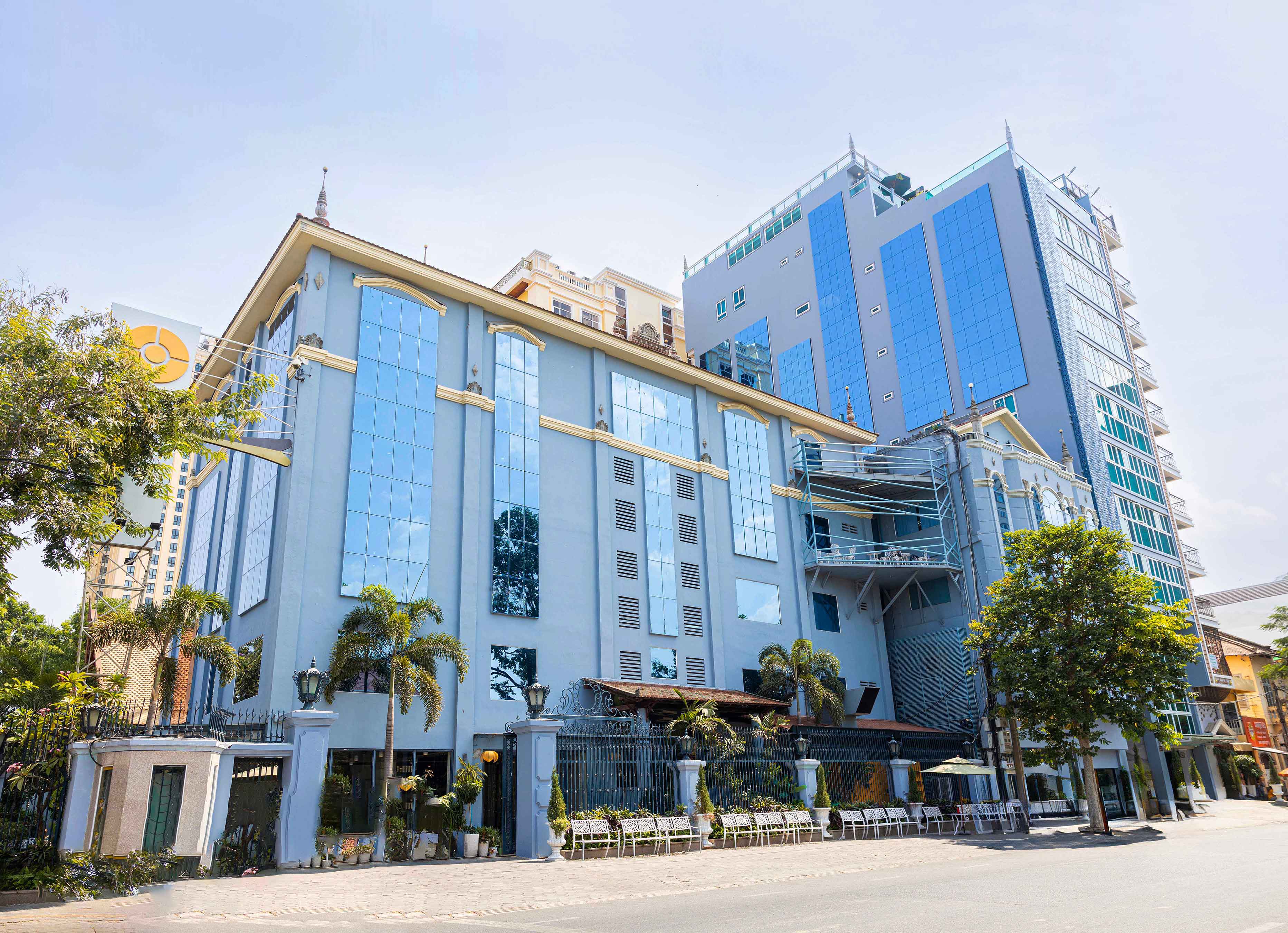|
CamEd Business School
CamEd Business School (), also known as CamEd Institute, is an institute of higher education in Phnom Penh, Cambodia. It specializes in teaching accounting and finance and is a primary source of new hires for major audit firms in Cambodia.“CamEd Business School Graduate Tracer Study 2018”. HR Inc. Cambodia. October 2018. Increasingly, CamEd graduates are dominating the ranks of new hires for banks, investment companies and the Cambodian General Department of Taxation.“CamEd students go on to pursue exceptional careers”Phnom Penh Post March 21, 2017. Retrieved May 13, 2019.“CamEd leads in developing financial talents for Cambodia’s capital market”Phnom Penh Post May 3, 2019. Retrieved May 13, 2019.Nhean, Moeun. “Accounting skills highly valued, says NBC”Phnom Penh Post September 27, 2016.Sithyna, Muny. “For bankers, market remains open”Times September 30, 2015. Retrieved May 13, 2019. CamEd works closely with the National Accounting Council of Cambodia and t ... [...More Info...] [...Related Items...] OR: [Wikipedia] [Google] [Baidu] |
Phnom Penh
Phnom Penh (; km, ភ្នំពេញ, ) is the capital and most populous city of Cambodia. It has been the national capital since the French protectorate of Cambodia and has grown to become the nation's primate city and its economic, industrial, and cultural centre. Phnom Penh succeeded Angkor Thom as the capital of the Khmer nation but was abandoned several times before being reestablished in 1865 by King Norodom. The city formerly functioned as a processing center, with textiles, pharmaceuticals, machine manufacturing, and rice milling. Its chief assets, however, were cultural. Institutions of higher learning included the Royal University of Phnom Penh (established in 1960 as Royal Khmer University), with schools of engineering, fine arts, technology, and agricultural sciences, the latter at Chamkar Daung, a suburb. Also located in Phnom Penh were the Royal University of Agronomic Sciences and the Agricultural School of Prek Leap. The city was nicknamed the "Pearl of ... [...More Info...] [...Related Items...] OR: [Wikipedia] [Google] [Baidu] |
Cambodia
Cambodia (; also Kampuchea ; km, កម្ពុជា, UNGEGN: ), officially the Kingdom of Cambodia, is a country located in the southern portion of the Indochinese Peninsula in Southeast Asia, spanning an area of , bordered by Thailand to the northwest, Laos to the north, Vietnam to the east, and the Gulf of Thailand to the southwest. The capital and largest city is Phnom Penh. The sovereign state of Cambodia has a population of over 17 million. Buddhism is enshrined in the constitution as the official state religion, and is practised by more than 97% of the population. Cambodia's minority groups include Vietnamese, Chinese, Chams and 30 hill tribes. Cambodia has a tropical monsoon climate of two seasons, and the country is made up of a central floodplain around the Tonlé Sap lake and Mekong Delta, surrounded by mountainous regions. The capital and largest city is Phnom Penh, the political, economic and cultural centre of Cambodia. The kingdom is an elec ... [...More Info...] [...Related Items...] OR: [Wikipedia] [Google] [Baidu] |
The Richard Thaler Lecture Hall At CamEd Business School
''The'' () is a grammatical article in English, denoting persons or things that are already or about to be mentioned, under discussion, implied or otherwise presumed familiar to listeners, readers, or speakers. It is the definite article in English. ''The'' is the most frequently used word in the English language; studies and analyses of texts have found it to account for seven percent of all printed English-language words. It is derived from gendered articles in Old English which combined in Middle English and now has a single form used with nouns of any gender. The word can be used with both singular and plural nouns, and with a noun that starts with any letter. This is different from many other languages, which have different forms of the definite article for different genders or numbers. Pronunciation In most dialects, "the" is pronounced as (with the voiced dental fricative followed by a schwa) when followed by a consonant sound, and as (homophone of the archaic pro ... [...More Info...] [...Related Items...] OR: [Wikipedia] [Google] [Baidu] |
Students Watching Video Lectures In The CamEd Business Library
A student is a person enrolled in a school or other educational institution. In the United Kingdom and most commonwealth countries, a "student" attends a secondary school or higher (e.g., college or university); those in primary or elementary schools are "pupils". Africa Nigeria In Nigeria, education is classified into four system known as a 6-3-3-4 system of education. It implies six years in primary school, three years in junior secondary, three years in senior secondary and four years in the university. However, the number of years to be spent in university is mostly determined by the course of study. Some courses have longer study length than others. Those in primary school are often referred to as pupils. Those in university, as well as those in secondary school, are referred to as students. The Nigerian system of education also has other recognized categories like the polytechnics and colleges of education. The Polytechnic gives out National Diploma and Higher Nation ... [...More Info...] [...Related Items...] OR: [Wikipedia] [Google] [Baidu] |
The Reading Room At CamEd Business School
''The'' () is a grammatical article in English, denoting persons or things that are already or about to be mentioned, under discussion, implied or otherwise presumed familiar to listeners, readers, or speakers. It is the definite article in English. ''The'' is the most frequently used word in the English language; studies and analyses of texts have found it to account for seven percent of all printed English-language words. It is derived from gendered articles in Old English which combined in Middle English and now has a single form used with nouns of any gender. The word can be used with both singular and plural nouns, and with a noun that starts with any letter. This is different from many other languages, which have different forms of the definite article for different genders or numbers. Pronunciation In most dialects, "the" is pronounced as (with the voiced dental fricative followed by a schwa) when followed by a consonant sound, and as (homophone of the archaic pro ... [...More Info...] [...Related Items...] OR: [Wikipedia] [Google] [Baidu] |
Universities And Colleges In Cambodia
A university () is an institution of higher (or tertiary) education and research which awards academic degrees in several academic disciplines. ''University'' is derived from the Latin phrase ''universitas magistrorum et scholarium'', which roughly means "community of teachers and scholars". Universities typically offer both undergraduate and postgraduate programs. The first universities in Europe were established by Catholic Church monks. The University of Bologna (), Italy, which was founded in 1088, is the first university in the sense of: *being a high degree-awarding institute. *using the word ''universitas'' (which was coined at its foundation). *having independence from the ecclesiastic schools and issuing secular as well as non-secular degrees (with teaching conducted by both clergy and non-clergy): grammar, rhetoric, logic, theology, canon law, notarial law.Hunt Janin: "The university in medieval life, 1179–1499", McFarland, 2008, , p. 55f.de Ridder-Symoens, Hilde' ... [...More Info...] [...Related Items...] OR: [Wikipedia] [Google] [Baidu] |
Educational Institutions Established In 2000
Education is a purposeful activity directed at achieving certain aims, such as transmitting knowledge or fostering skills and character traits. These aims may include the development of understanding, rationality, kindness, and honesty. Various researchers emphasize the role of critical thinking in order to distinguish education from indoctrination. Some theorists require that education results in an improvement of the student while others prefer a value-neutral definition of the term. In a slightly different sense, education may also refer, not to the process, but to the product of this process: the mental states and dispositions possessed by educated people. Education originated as the transmission of cultural heritage from one generation to the next. Today, educational goals increasingly encompass new ideas such as the liberation of learners, skills needed for modern society, empathy, and complex vocational skills. Types of education are commonly divided into f ... [...More Info...] [...Related Items...] OR: [Wikipedia] [Google] [Baidu] |


.png)

